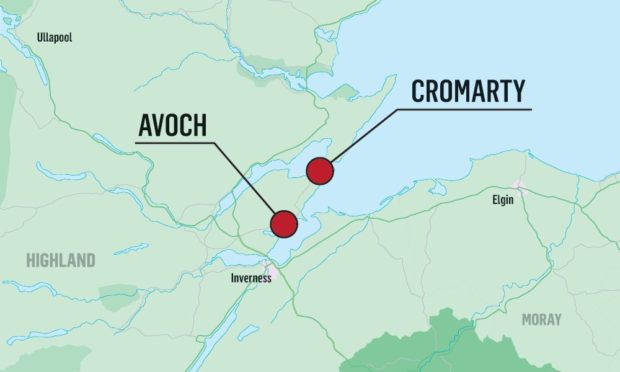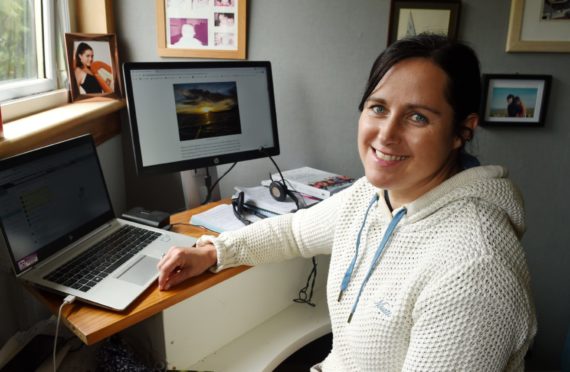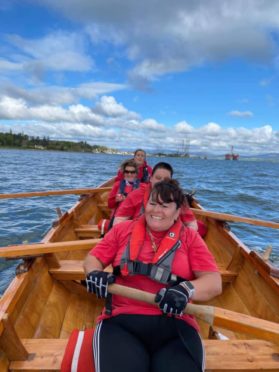When Mari Todd started studying the impact of coastal rowing groups, she had little idea of what she would discover… or that she would develop a love for the sport herself.
We all know rowing is a great cardiovascular workout, exercising your heart, arms and legs.
And what better way to do it than being out in the open sea taking in the sights and sounds of nature, as you row along the rugged coast of Scotland.
Coastal rowing first launched as a sport in 2010 and the nautical craze has since grown so popular there are now more than 70 clubs across the country.
Mari Todd, a psychology lecturer at Inverness College UHI, has been studying the impact the sport has on individuals and communities.
When she approached two rowing clubs in Avoch and Cromarty they agreed to take part in the study – so long as Mari tried it out herself.
Not only did Mari form strong bonds and make new friends, but she soon found herself more connected to the community.
‘What’s clear is the passion, not just for rowing, but for the community’
Mari, who lives in Avoch, described it as an “immersive” experience.
She said: “I’ve got friends here who are involved in community rowing. I approached them and said I would be interested in researching the impact it has on people.
“They said ‘that’s great, as long as you come and give it a go’. And so I did, and of course, I got completely hooked.
“I found it created a feeling of belonging, of being part of a community, and that I would offer to volunteer, such as doing six weeks of orienteering coaching for the local kids.
“Trust came through as being a big part of connection with people. If people are going through hard times, I think being able to come to rowing has helped because you maybe talk to people that you row with regularly about things that you maybe wouldn’t talk to anyone else about.
“It’s a strong bond that you end up having with everybody and it’s really nice to have that in your local community.
“People who are involved have that support from the people around them in the club and that can only be good for your mental health and wellbeing.
“What’s clear is the passion, not just for rowing, but the community. If people identify strongly with their community and are more willing to put more in and support others, then that will have an impact on everybody and helps everyone have more support.”
The research was carried out as part of the lecturer’s Master’s in Sports and Exercise Psychology.
Around 70 members from the Avoch Community Rowing Club and Cromarty Community Rowing Club were either given a survey to fill in, or were interviewed about their experiences.
Kathy Taylor, 49, one of the founders of the Avoch group, which launched in 2014, told how members are encouraged to help build wooden boats, known Skiffs, and they can take part in social rowing as well as racing regattas, competing with other teams from across the world.
Kathy, of Avoch, who works as a fish vaccinator, said: “I’ve lived here for 24 years and to be honest was still an outsider until we started the boat club. We row competitively against the other clubs and it brings a bit of pride into the village.
“The good thing about coastal rowing is that everybody can do it, you don’t have to be really fit.
“We can take the boat out, sit in the Moray firth and have a yap so it’s good for the social side.
“On the competitive side we hold our own and we’ve won quite a few gold medals so we’re not too bad.”
‘You forget the hectic lifestyles when you get out on the water’
Wanda MacKay, who works as a youth development officer, has been a member of the Cromarty club since it first launched in 2016.
She said the rowing group had helped combat loneliness in the community and at one point had around 200 rowers – a quarter of its population.
The 50-year-old said: “From a personal point of view when I get out in the water there’s a feeling of total peace and being happy. You forget the humdrum of work and the hectic lifestyles and all the things that have been difficult about the past year.
“I do feel really lucky, for me it’s far more for your mental health than your physical health.
“Everyone who joins says they’re not going to be competitive but that doesn’t usually last very long, they usually don’t take long to change their mind! But it’s open for everyone, it doesn’t have to be about competitions, for our older people it’s about taking part and seeing each other.
“There’s people who have left work, lost their colleagues, their friends and their focus and they’ve joined rowing and they’re now on social media groups and have people in their lives again.
“It does pull people together, even people who don’t row are part of the group.”
‘You get a different perspective out at sea’
2021 is a big year for community rowing groups across Scotland.
The Scottish Coastal Rowing Association was formed in 2010 after the first skiff was built in Anstruther.
And the association was due to launch a Row Around Scotland event last year to celebrate its 10th anniversary, which ended up being postponed due to coronavirus.
The Scottish Coastal Rowing Association has been supporting Mari’s research into the impacts of the sport.
Mari said the most surprising discovery of her research was finding out that rowers felt much more connected to where they lived.
They often build up a better understanding of the heritage of coastal communities, passing on traditional skills to youngsters and start appreciating a different view of familiar places.
She said: “I think it’s really striking being involved in a programme which enhances your connection to place as much as your connection to each other, you’re more involved in nature, you’re more aware of the tides, the weather, what’s going on around you. You get a different perspective because you’re out at sea.
“When you’re out on the boat sometimes you will stop for a minute and sit and watch the wildlife – it’s a different experience. People reported feeling it brought them closer to nature and gave them a sense of awe that comes with being a part of nature but it also brought them closer to the heritage of the coastal communities.

“I think for Avoch and Cromarty it has brought those two communities closer together. People have been getting involved in other community projects, such as the amenities association which is trying to build a new sports facility in the village, they’ve already built pitches.
“We’ve also been thinking of getting paddle boards for the village that people can hire out. It’s a real feeling of what can we all put in to make the community better.”

